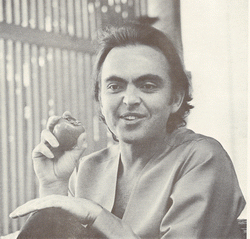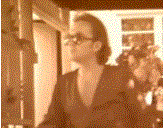
Experiences Are a
Demand, Not a Path
Excerpts from talks given by
Bubba Free John (Adi Da Samraj) to his devotees in 1973 and
1974, complied, edited and adapted by
Beezone.

Every
person tends to become profoundly involved in the qualities
of his own experience at this moment, whatever those
qualities are. So if you happen to be having particularly
intense internal meditative experiences, some sense of
energy, of profundity, of silence, you tend to become
involved with that, concerned with that, identified with
that, hopeful about that. If something is happening to you
in the circumstances of your life that is particularly
exciting, or particularly saddening, or particularly
extraordinary in one form or another, positive or negative,
you tend to become involved with that, concerned with that,
hopeful or losing hope over that. So we are all always
involved with whatever it is that is happening, and I am
continually having to redirect people from the excursions
they make into their own self-meditation back to the whole
affair of this intelligent life
of understanding.
process is only begun when consciousness begins to become
the overriding function or factor of continued existence and
becomes a force in life”
The spiritual process takes place in
consciousness.
The fundamental process is in consciousness, not in all of
the functions with which consciousness tends to be
associated. So you have experiences of changes in the body,
experiences of movements in the vital and in the nervous
system, visions in the psychic dimensions, and insights in
the mental dimension, and these are all modifications of
your functions. But the fundamental event is in
consciousness, and consciousness is continuous.
Consciousness is itself unmodified, so the real spiritual
process is an ongoing present conscious affair, and we must
be responsible for it.
All life is itself change,
limitation, so the spiritual process isn’t begun merely by
the initiation of experience. The spiritual process is only
begun when consciousness begins to become the overriding
function or factor of continued existence and becomes a
force in life. Consciousness itself masters and creates the
ultimate transformation of life by making life responsive to
the Divine, but experience itself is just the modification
of life, the modification of functions. You could have a
vision every five seconds for eternity, but it would not
produce the ultimate event of conscious life.
A “spiritual” experience is a sign
of something taking place, but in itself it does not
represent something you can hold on to. It will change, and
in itself it will be undone. All of these insights and
experiences are just a meal, just fertilizer at last. They
themselves are always disappearing and becoming obsolete,
but the true force of spiritual life is implied in the midst
of them. They are themselves a kind of demand,
but not a path. Because they are dying, they may serve the
ultimate realization by which they are mastered by
consciousness. Experience never comes to an end. There is no
end phenomenon, because the consciousness in which phenomena
arise is itself the ultimate Reality. But that very
consciousness must become the presence in which you live, by
which you represent yourself, rather than the functional
drama to which you tend to make your very consciousness
subject.
When I was in college, I made a
decision to exploit the possibilities of life. Then, at a
particular point the crisis
of consciousness intervened
and made that whole program unnecessary. I experienced all
kinds of things that we ordinarily call life during that
time. But not everything. How could everything have been
experienced? This moment was not experienced. Being you was
not experienced. Just a certain range of experiences,
ordinary and extraordinary, common to what we call life, was
endured. But the crisis occurred. Even at the point when the
crisis is perfect in you, you will not have experienced
everything. You will not have experienced what is going to
happen to you in the next moment. The next moment’s
experience is not necessary for your transformation if the
crisis occurs in this moment. Therefore, no experience is
necessary or identical to Truth.
does not create Truth. Experience only serves the Truth in
Satsang”
Just so, the devotee is free of the
process of experience. He is already free. He already is in
Satsang. He already understands. So, while all kinds of
experiencing may be going on, he already lives the principle
of Truth. Experience does not create Truth. Experience only
serves the Truth in Satsang. Conditions serve the Truth.
Conditions are generated in Satsang by the Guru, and they
produce the phenomena of crisis that are useful in Satsang
for the conscious transformation of individuals-. But
without this Satsang,
the conditions are simply that. People have experienced vast
amounts of possible things. But this experiencing has not
made them free.
The Guru uses the capacity for
experience in his devotee as an instrument for his
transformation. The way he does this is by creating
conditions, external and
internal. But if the way of experience were the way of
Truth, then the Guru would create some sort of an
institution where people could experience everything very
quickly. He would find all the instruments for creating
experience. But the life of understanding is not in itself a
way of having experiences, resisting experiences, or
controlling them. It is a matter of understanding
yourself in this moment
under the conditions that exist, seeing the precise activity
that is your own.
are sadhana for one who is understanding, and all are forms
of bondage to one who does not understand”
You must continually return to this
principle of our life together, this Satsang, and make all
your experiences the instruments of this sadhana. No matter
what is arising in your life, within, without, in between,
every instant of it is another condition in which
understanding is appropriate. Under no conditions is
obsessive involvement, positive or negative, with
conditions. themselves appropriate. All conditions are
sadhana for one who is understanding, and all are forms of
bondage to one who does not understand. You must begin to
become a little sensitive to your capacity for illusion,
your capacity for fascination, for obsession, for
distraction, for unconsciousness. You must begin to be
responsible
for that.

…Adi
Da Samraj
Are
There More Fish in the Ocean on a Sunny Day, or on a Cloudy
Day?